|
|
|
Sort Order |
|
|
|
Items / Page
|
|
|
|
|
|
|
| Srl | Item |
| 1 |
ID:
174794
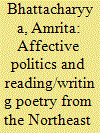

|
|
|
|
|
| Summary/Abstract |
Theorization of cultural and political issues of Northeast of India often creates a disengagement from the actual cultural performances produced in the region. This unique geo-cultural place is sometimes homogenized. In actuality, it is the home of diverse socio-cultural practices and performances. In the context of globalization, deforestation, Christianization, other internal clashes and external influences, material bodies, here, are continuously being rewritten in socio-cultural sphere. Non-representational theory considers poetry as an effective mode of exhibiting the virtual multiplicity of the nonrepresentational world. This paper will focus on exploring the corpus of Northeast Indian English poetry that focuses on social practices and bodily experiences to interpret the entire cultural flow of everyday life. As Non-representational Theory positions ‘affect’ as a central issue to individual and collective disposition in constituting the affective political discourse, this paper will also indicate some political imperatives by advancing a politics of hope in the realm of socio-political sphere.
|
|
|
|
|
|
|
|
|
|
|
|
|
|
|
|
| 2 |
ID:
159391


|
|
|
|
|
| Summary/Abstract |
The literary corpus of the sixteenth-century North Indian bhakti poet-saint Mirabai has grown over time as devotees have used (and continue to use) her name, life story and first-person voice in poems. Drawing on hagiographies, written and oral poems, printed collections and performative engagements with Mira, I argue that these moments of autobiographical ‘posing’ reveal autobiography as powerful for speaking about religious transformation, in particular the issues of authority, experience and critique. Furthermore, the centrality of autobiographical speech in the tradition is linked to an increasing emphasis on Mira as a figure of religious transformation, and bhakti itself as a transformative path.
|
|
|
|
|
|
|
|
|
|
|
|
|
|
|
|
| 3 |
ID:
168986
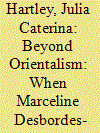

|
|
|
|
|
| Summary/Abstract |
This article follows a thread of translation and intertextual dialogue, taking us from the thirteenth-century Persian poet Saʿdi to the nineteenth-century French poet Marceline Desbordes-Valmore. It reads Desbordes-Valmore’s poem ‘Les roses de Saadi’ (1860) with the two passages from Saʿdi’s Golestān from which it was inspired, shedding new light on the poem’s metapoetic subtext. The original Persian text is compared to two French translations that were circulating at the time when Desbordes-Valmore was writing. This analysis of the Golestān’s reception forms the basis for the argument that Desbordes-Valmore recast in secular terms Saʿdi’s discourse on poetic language, emphasizing the continuity, rather than difference, between her concerns and Saʿdi’s. The case of Desbordes-Valmore thus reveals a forgotten facet of nineteenth-century French engagements with Middle Eastern culture: one of identification and literary influence, which existed alongside the processes of “othering” for which the period is better known.
|
|
|
|
|
|
|
|
|
|
|
|
|
|
|
|
| 4 |
ID:
161394
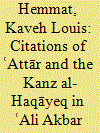

|
|
|
|
|
| Summary/Abstract |
ʿAli Akbar Khatāyi’s Khatāynāmeh (Book of China), a detailed description of state and society in Ming China written in 922/1516, includes citations from the Kanz al-Haqāyeq (attributed to Mahmud Shabestari) and ʿAttār’s Elāhināmeh. By citing these two texts at key points in his description of the Chinese government, Khatāyi articulates a radical political vision in which the civil officials, rather than the emperor, are the true rulers. Furthermore, by using the Kanz al-Haqāyeq as a portal text, and through frequent citations of other gnostic poetry, he crafts his own authorial presence by identifying his own text with fotovvat and gnosticism, and invokes a conceptual framework based on the thought of Ibn ʿArabi epitomized in his intertexts.
|
|
|
|
|
|
|
|
|
|
|
|
|
|
|
|
| 5 |
ID:
102289
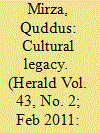

|
|
|
| 6 |
ID:
091096
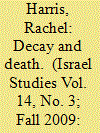

|
|
|
|
|
| Publication |
2009.
|
| Summary/Abstract |
The city's motto "I will build you and you will be rebuilt," from Jeremiah (31:4) is confronted and even challenged in literary depictions of Tel-Aviv. The mythology prevalent in the city's creation narrative is shattered through the use of urban tropes, such as the street, prostitution, urban sprawl, and the protagonist's isolation, and even eventual suicide, in fictional texts from the 1970s onwards. This article examines texts by Ya'akov Shabtai, Binyamin Tammuz, Yehudit Katzir, and Etgar Keret in which Tel-Aviv, in failing the unique ideology of the first Jewish city, becomes the genuine urban experience for which it was intended-a city like any other.
|
|
|
|
|
|
|
|
|
|
|
|
|
|
|
|
| 7 |
ID:
101290
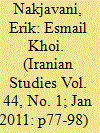

|
|
|
|
|
| Publication |
2011.
|
| Summary/Abstract |
This article focuses on how Esmail Hkoi poetically inhabits the world of his poetry as an observer and visionary explorer. Its aim is to make manifest how he engages his readers in reciprocal poetic dialogues to communicate his unique vision of the lived world. The dialogic function of his poetry is then examined as the ground of emergence of an experiential poetic mode of knowledge of the human condition. The article also considers Khoi's poetry as work done in the fields of language, alchemically transmuting everyday language of communication into poetic discourse. Finally, an analysis of his poem "To the Aged Mulberry Branch" explicates how Khoi can create a world of imagination whole and entire unto itself by his minimalist approach to poetry.
|
|
|
|
|
|
|
|
|
|
|
|
|
|
|
|
| 8 |
ID:
145465
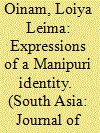

|
|
|
|
|
| Summary/Abstract |
Although contemporary Manipuri poetry is preoccupied with violence and the politics that has plagued the state, a return to modernist poetry, prominent in the 1970s, reconfigures the discourse surrounding identity formation in Manipur. The essay focuses on the modernist poet Thangjam Ibopishak to study the change in the constitution of identity in a pervasive military culture. It argues that Ibopishak's poetry is an important intervention in our understanding of societies characterised by processes of militarisation, and the victimised subjectivities that emerge from that milieu. His poetry, marked by irony and satire, invents a new poetic idiom to address issues such as military excess, victimhood, censorship and the poet's own position as subject.
|
|
|
|
|
|
|
|
|
|
|
|
|
|
|
|
| 9 |
ID:
092522
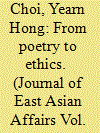

|
|
|
| 10 |
ID:
170676
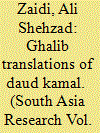

|
|
|
|
|
| Summary/Abstract |
Daud Kamal (1935–87), the preeminent English language poet of Pakistan, left behind many unpublished translations of poems by the classical Urdu poet Mirza Ghalib (1797–1869). This article presents and discusses several of these translations in the light of historical events during Ghalib’s lifetime. Although he endured many personal tragedies, Ghalib attained mystical heights that confirm his stature as the greatest Urdu poet.
|
|
|
|
|
|
|
|
|
|
|
|
|
|
|
|
| 11 |
ID:
131858
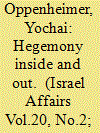

|
|
|
|
|
| Publication |
2014.
|
| Summary/Abstract |
This article examines the political protest expressed by Nathan Alterman over the years in poems published in the newspapers. It argues that this criticism identifies with the hegemonic political values rather than articulate alternative ones, in an attempt to nurture self-criticism on the part of the government regarding its failures and mistakes. This type of criticism seeks to preserve the reigning hegemony from within and to ensure that it projects an image of moral rectitude.
|
|
|
|
|
|
|
|
|
|
|
|
|
|
|
|
| 12 |
ID:
131856


|
|
|
|
|
| Publication |
2014.
|
| Summary/Abstract |
This article traces the motif of the living-dead in Nathan Alterman's poetry, beginning with Stars Outside and through Ten Plagues of Egypt to The City of the Dove, indicating the way in which Alterman's literary-symbolic structure was gradually replaced by a historical-literary one that reflects the influence of historical events - the two world wars, the Holocaust, and the War of Independence. With the wiping out of Jewish existence and literature, the Jewish hero became the Jewish victim and national symbol who in sacrificing himself ensured the life of the nation.
|
|
|
|
|
|
|
|
|
|
|
|
|
|
|
|
| 13 |
ID:
119971
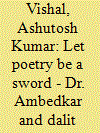

|
|
|
| 14 |
ID:
182658
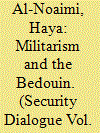

|
|
|
|
|
| Summary/Abstract |
This article investigates the development of militarism in the Arab Gulf using the militarized representation of the Bedouin and their poetic tradition as a site for its analysis. The article traces the ways in which Bedouin ‘martial masculinities’ and Bedouin culture have been appropriated and transformed by British colonialism and postcolonial nationalisms to produce unusual patterns of militarism within the Gulf. It addresses a gap in international relations and security studies literature, in which militarism is examined through state-centric and methodologically nationalist framings that largely overlook transnational and colonial histories. The article argues that contemporary displays of militarism by Qatar and the United Arab Emirates should be read in relation to how colonialism engendered militarism across the Gulf region through the paradoxical representation of the Bedouin as a ‘martial race’ whose martial-ness was also seen as a security ‘threat’ for the colonial/postcolonial state. Militarized responses and rationalities were normalized within Gulf society through the ‘Bedouin warrior’ stereotype, which served as a timeless and fixed construct, connecting the Gulf’s disjointed past to its present-day context. Significantly, the ‘Bedouin warrior’ stereotype helps foster the belief that stability and historical continuity underpin state-modernization processes in Qatar and the United Arab Emirates. The article’s intervention seeks to disrupt this continuity by looking at how militarism and its martial constructs created ruptures in state trajectories, using the example of the 1996 coup attempt, citizen revocations, and the depoliticization of the poetic act as evidence for the claim that militarism engenders particular insecurities for Bedouin populations in the Arab Gulf.
|
|
|
|
|
|
|
|
|
|
|
|
|
|
|
|
| 15 |
ID:
175490
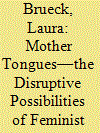

|
|
|
|
|
| Summary/Abstract |
This essay considers the methodological intervention of understanding a ‘mother tongue’ (matribhasha) as a gendered vernacular. It seeks to illustrate the subversive potential of the vernacular as a gendered lens though which we can understand the Dalit feminist critiques of caste hierarchies and Dalit and non-Dalit patriarchies, and the places they intersect. The essay considers the works of Anita Bharti and Meena Kandasamy, contemporary Dalit women authors who write in Hindi and English, respectively. Thus, this paper extends the definition of the vernacular beyond the confines of linguistic and regional specificity, allowing for a feminist reclamation of the term.
|
|
|
|
|
|
|
|
|
|
|
|
|
|
|
|
| 16 |
ID:
107547
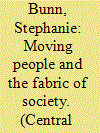

|
|
|
|
|
| Publication |
2011.
|
| Summary/Abstract |
This article explores the relationship between continuity and change in Central Asian domestic felt textile production. In order to set this in the context of a pastoralist perspective, the paper draws on regional practices such as oral poetry and movement through landscape, as well as human-environment relations in order to reveal the dynamic and creative improvisatory process through which local textile production can be understood. In so doing, it examines whether Euro-American anthropology's rejection of a 'static' notion of 'tradition' for one of hybridity (reflecting a critique of its own nostalgia), has inadvertently moved us away from a focus on the historical narratives of those we study, which is often at odds with their own concerns. The author argues that for 'moving people', it is the dynamics of orality, human-environment relations and the practice (rather than the evidence) of material culture that elucidates our understanding of the relationship between continuity and change. The power of felt is thus reflected in the apparently ephemeral, non-enduring, aspects of these practices, which are what makes them endure, continuously bringing the past into being for new cultural futures.
|
|
|
|
|
|
|
|
|
|
|
|
|
|
|
|
| 17 |
ID:
106241
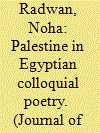

|
|
|
|
|
| Publication |
2011.
|
| Summary/Abstract |
Shi'r al-'ammiyya is a poetry movement whose emergence in Egypt in the early 1950s coincided with the heyday of Nasser's revolution, when the Palestine question was a national concern. With numerous practitioners today, the movement has yielded a large corpus of colloquial poetry that has become a significant part of Egypt's cultural landscape.This article presents a historical survey of shi'r al-'ammiyya's best known poets-Fu'ad Haddad, Salah Jahin, and 'Abd al-Rahman al-Abnudi-and their poems on Palestine. Among the essay's aims is to dispel the common misconception that the use of colloquial Egyptian ('ammiyya) denotes parochial rather than pan-Arab concerns, with the standard (fusha) Arabic seen as a signifier of pan-Arab identity.
|
|
|
|
|
|
|
|
|
|
|
|
|
|
|
|
| 18 |
ID:
140175
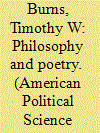

|
|
|
|
|
| Summary/Abstract |
The subordination of poetry to rational guidance has been denounced as a symptom of a specifically Western sickness, with its origin in Plato's Republic. But Plato's disposition to the poets is more complex than is often supposed. Although Book Three's education in civic virtue includes a call for an austere, civic poetry, in Book Ten Socrates finds the wisdom of this provision to need a serious reconsideration, one made necessary because philosophy has emerged as the true answer to the search for a genuinely fulfilling, happy life. Book Ten's reconsideration quietly shows that great poets like Homer are wiser than the earlier examination had suggested, especially about death, and are even indistinguishable from Socratic philosophers in their understanding of and disposition toward death and so in the related matter of the best human life.
|
|
|
|
|
|
|
|
|
|
|
|
|
|
|
|
| 19 |
ID:
181333
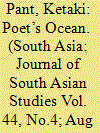

|
|
|
|
|
| Summary/Abstract |
This essay explores an unusual vernacular source of poetic writings by Asim Randeri (1904–2009), a Muslim poet from a merchant family of Gujarat, in order to understand how the imagination—particularly when engaged through poetry and piety—became a charged realm in which Indian Muslims responded to British colonial pressure on them, expressing the itinerancy at the heart of mercantile life that separated individuals from their families, port city and wider community. Recent scholarship has focused on the economic pursuits of Gujarati merchants in port cities across the Indian Ocean in the nineteenth and twentieth centuries and even earlier. This article shifts the analysis to their diasporic imagination, as a correlate of itinerant commerce. Through this essay, I reflect on the many temporalities and internal social dynamics at play in the mercantile imaginations that emerge from Gujarati trader communities. These, I demonstrate, provide a sharp contrast to the short-term framing emphasised by Western historiographical traditions rooted in linear history and colonial records.
|
|
|
|
|
|
|
|
|
|
|
|
|
|
|
|
| 20 |
ID:
131854
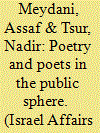

|
|
|
|
|
| Publication |
2014.
|
| Summary/Abstract |
Political poetry is not tested by its impact and the number of its readers but in its very participation in the public discourse on the issues of the day. Poetry moves between forces that focus the attention of its audience inwards, to the lyrics of the poems, and the forces that connect to the social, cultural, and political climate in which the poems are published. These movements reflect the power of poetry, which, using language, breaks the barriers that exist between people - individuals or groups, as well as between these individuals or groups and reality. This way, the poet serves as the element that formulates the informal cultural feelings in society and offers an interpretive package of the existing reality, as well as the alternative reality. Poets place their 'truth' within the perception of reality, and this truth can compete in the public arena with the 'truth' that is portrayed by politicians.
|
|
|
|
|
|
|
|
|
|
|
|
|
|
|
|
|
|
|
|
|